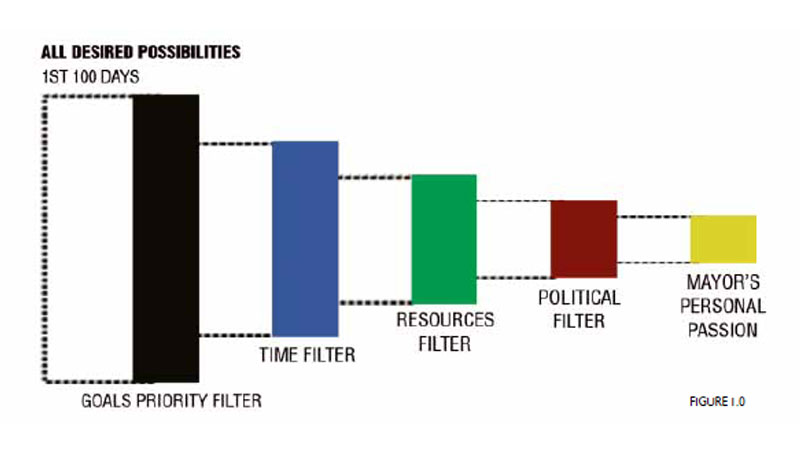Filtering our mayor’s priorities
THE LOCAL Government Academy (LGA) gave me the privilege of addressing our newly elected officials at the municipal level on strategic management, and I started doing that last June 21, 2016.
Given one hour, I chose not to go into the “hows” of strategic planning and instead delve into the “whys” and “wherefores,” asking the 100+ newly elected mayor questions like:
1. Why did you run?
2. What do you mean by “service” or “serving the people?” (I like how that phrase from Mao has become very popular.)
3. What do you hope to achieve?
4. How do you prevent yourselves from becoming trapos?
5. How will you avoid the temptations of “dynasty” building?
I did not expect answers. It was enough that the seeds of contemplation, caution and discernment were planted in their consciousness.
And I also recognized that they have effectively only two years to produce the first of many desired results in the areas in which they made promises to their people if they are to have bases for their re-election campaigns on the third year.
So I presented them with a framework which I think might help them decide within the first 30 days what they might work on to produce the first evidence of delivering on their promises at the end of the first 100 hundred days (three months and a week).
(See Figure 1.0 for graphic presentation of the framework.)

I then asked them to run all these through what I call the “Goals Priority Filter,” which are their own stated goals that reflect their judgement as to which goals are the most important and at the same time produce palpable results within a relatively short period of time. The exercise should substantially reduce the number of projects they will consider.
The next step is to run these list through what I call a “Time Filter,” objectively assessing which of the desired projects can be done well and well within the 100 days so that the desired results (both by the new mayor and his constituency) are manifest even before the 100 days expire.
The next step is to use what I call the “Resources Filter,” i.e., what resources can they realistically muster and deploy within the first 15 to 30 and beyond days to fund the identified projects. Again, this constraint will reduce the number of projects.
Then, there is the “Political Filter,” which asks the question, “Which of these will generate the most support from the widest range of constituents while engendering the least resistance from any group?” Much objective discernment is needed here and the lessons learnt can only strengthen decision making for the future. Again, this ought to take out a few more.
Finally, there is what I would call the “Mayor’s Passion Filter,” what the mayor truly wishes to work on heart and soul and will therefore dedicate himself to working at almost 24/7! This is the final step and ought to produce at least two to three viable projects.
I also gave them several examples of projects I have seen accomplished in short periods of time.
In one municipality, the mayor allowed poor families to plant a combination of fast and slower growing vegetables that one can harvest after a month or so in the town plaza. He made space available to the families to sell their produce after they have taken out what they will need for their own consumption. He bundled their produce and helped negotiate with buyers from other communities. These provided both food—and therefore better nutrition and health—and cash, not to mention a better sense of pride and dignity to the families.
Another mayor, a lady, asked for help from several private corporations to help provide potable water in her town which has potable water problems. The families could go to a central water dispersing outlet where families with cards could withdraw measured amounts of potable water per day per family member. The well was drilled and water processing systems provided by the companies in exchange for tax rebates.
Another mayor focused on real estate and business taxes collection. She found out that their collection rates were a dismal 30 percent and that arrears run as far back as five years. She gave her assessor an ultimatum. Collect or be prepared to have dismissal procedures initiated against you. In six weeks’ time, the collection levels went up to 50 percent and arrears reduced to 3.5 years. After a year, collection had gone up to 85 percent and arrears reduced to 1.5 years.
In another municipality, the mayor worked with the provincial governor to build an all-gravel service road, hiring members of his constituency to do the labor while learning skills via the provincial engineer’s office.
There are clearly many such projects the NEOs can use. I hope the exposition helps them do a good job for the sake of our people.
P.S. I received requests for further direct help from many of them. My privilege and my pleasure.
(The article reflects the personal opinion of the author and does not reflect the official stand of the Management Association of the Philippines or M.A.P. The author is the Chair of the M.A.P. Management Development Committee and the M.A.P. National Security Committee, and a Professor at the Asian Institute of Management (AIM). Feedback at <map@map.org.ph> and <maglopez@gmail.com>. For previous articles, please visit )
